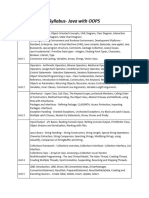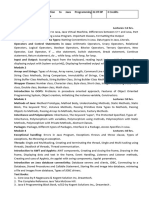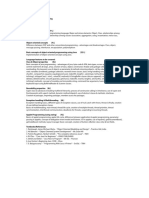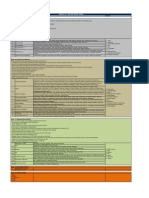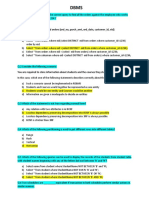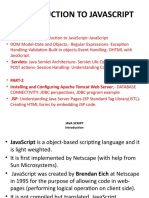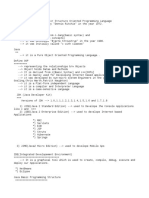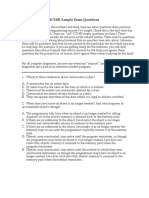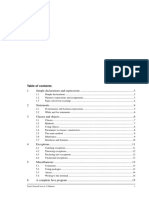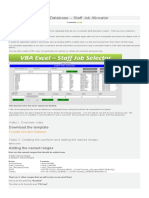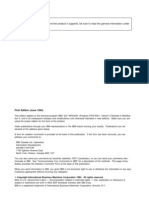0 ratings0% found this document useful (0 votes)
63 viewsJava Notes
The document provides an overview of topics that will be covered in Java notes, including OOP concepts like abstraction, encapsulation, inheritance, and polymorphism. It also lists topics related to Java programming like history, data types, variables, operators, control flow, arrays, methods, inheritance, polymorphism, interfaces, packages, exceptions, multithreading, collections, files, database connectivity, GUI programming with Swing, and event handling.
Uploaded by
Sunita GaikwadCopyright
© © All Rights Reserved
Available Formats
Download as DOC, PDF, TXT or read online on Scribd
0 ratings0% found this document useful (0 votes)
63 viewsJava Notes
The document provides an overview of topics that will be covered in Java notes, including OOP concepts like abstraction, encapsulation, inheritance, and polymorphism. It also lists topics related to Java programming like history, data types, variables, operators, control flow, arrays, methods, inheritance, polymorphism, interfaces, packages, exceptions, multithreading, collections, files, database connectivity, GUI programming with Swing, and event handling.
Uploaded by
Sunita GaikwadCopyright
© © All Rights Reserved
Available Formats
Download as DOC, PDF, TXT or read online on Scribd
You are on page 1/ 2
The topics we will cover in these
Java Notes PDF will be taken from the following list:
OOP Concepts: Data abstraction, encapsulation, inheritance, Benefits of Inheritance,
Polymorphism, classes, and objects, Procedural and object-oriented programming
paradigms.
Java Programming: History of Java, comments, Data types, Variables, Constants, Scope
and Lifetime of variables, Operators, Operator Hierarchy, Expressions, Type conversion
and casting, Enumerated types, Control flow- block scope, conditional statements,
loops, break and continue statements, simple java stand-alone programs, arrays, console
input and output, formatting output constructors, methods, parameter passing, static
fields and methods, access control, this reference, overloading methods and
constructors, recursion, garbage collection, building strings, exploring string class.
Inheritance: Inheritance hierarchies super and subclasses, Member access rules, super
keyword, preventing inheritance: final classes and methods, the Object class and its
methods.
Polymorphism: Dynamic binding, method overriding, abstract classes, and methods.
Interfaces- Interfaces Vs Abstract classes, defining an interface, implement interfaces,
accessing implementations through interface references, extending interface.
Inner Classes: Uses of inner classes, local inner classes, anonymous inner classes, static
inner classes,
Packages: Defining, creating, and accessing a package, Understanding CLASSPATH,
importing packages.
Exception handling: Dealing with errors, benefits of exception handling, the
classification of exceptions- exception hierarchy, checked exceptions and unchecked
exceptions, usage of try, catch, throw, throws and finally, rethrowing exceptions,
exception specification, built-in exceptions, creating own exception subclasses.
Multithreading: Differences between multiple processes and multiple threads, thread
states, creating threads, interrupting threads, thread priorities, synchronizing threads,
inter-thread communication, producer-consumer pattern, Exploring java.net, and
java.text
Collection Framework in Java: Introduction to java collections, Overview of java
collection framework, Generics, Commonly used collection classes- Array List, Vector,
Hash table, Stack, Enumeration, Iterator, String Tokenizer, Random, Scanner, Calendar,
and Properties
Files: Streams- Byte streams, Character streams, Text input/output, Binary input/output,
random access file operations, File management using File class.
Connecting to Database: JDBC Type 1 to 4 drivers, Connecting to a database, querying
a database, and processing the results, updating data with JDBC.
GUI Programming with Java: The AWT class hierarchy, Introduction to Swing, Swing Vs
AWT, Hierarchy for Swing components, Containers – Jframe, JApplet, JDialog, JPanel.
Overview of some Swing components – Jbutton, JLabel, JTextField, JTextArea, simple
Swing applications, Layout management – Layout manager types – border, grid, and
flow.
Event Handling: Events, Event sources, Event classes, Event Listeners, Relationship
between Event sources and Listeners, Delegation event model, Examples: Handling a
button click, Handling Mouse events, Adapter classes.
You might also like
- Introduction To Java Programming LanguageNo ratings yetIntroduction To Java Programming Language2 pages
- PD Dac: Concepts of Programming & Operating SystemNo ratings yetPD Dac: Concepts of Programming & Operating System5 pages
- Java-J2Ee: Object-Oriented Programming (OOPS) ConceptsNo ratings yetJava-J2Ee: Object-Oriented Programming (OOPS) Concepts12 pages
- 92 Corrected and Approved by B.T.E. On Dated 19.04.2017No ratings yet92 Corrected and Approved by B.T.E. On Dated 19.04.20172 pages
- Online Core Java Training - Java Core Online Training in USA, Uk, Canada, Australia, Dubai, IndiaNo ratings yetOnline Core Java Training - Java Core Online Training in USA, Uk, Canada, Australia, Dubai, India8 pages
- Croma Campus - Core Java Training CurriculumNo ratings yetCroma Campus - Core Java Training Curriculum8 pages
- Object-Oriented Programming (OOPS) ConceptsNo ratings yetObject-Oriented Programming (OOPS) Concepts9 pages
- DN2.0 - JAVA UpSkill Learning Recommendations - PRONo ratings yetDN2.0 - JAVA UpSkill Learning Recommendations - PRO19 pages
- Object_Oriented_Programming_through_Java_Digital_Notes_Maruthi_PNo ratings yetObject_Oriented_Programming_through_Java_Digital_Notes_Maruthi_P136 pages
- Manipal Karnataka 576 104: A Constituent College of Manipal University, Manipal)No ratings yetManipal Karnataka 576 104: A Constituent College of Manipal University, Manipal)4 pages
- Answer : Find Missing Element in List of ArrayNo ratings yetAnswer : Find Missing Element in List of Array3 pages
- Introduction To Javascript: Unit-2 SyllabusNo ratings yetIntroduction To Javascript: Unit-2 Syllabus340 pages
- Acknowledgement: Anuradha Purohit, She Guided Us in Preparation of The Project and Every TimeNo ratings yetAcknowledgement: Anuradha Purohit, She Guided Us in Preparation of The Project and Every Time28 pages
- An Introduction To PL/SQL: Team Rainbow & WaseNo ratings yetAn Introduction To PL/SQL: Team Rainbow & Wase312 pages
- Exception Handling &: Multithreaded ProgrammingNo ratings yetException Handling &: Multithreaded Programming32 pages
- Referensi PLSQL Semester 1 Mid Term ExamNo ratings yetReferensi PLSQL Semester 1 Mid Term Exam61 pages





